BRAT Diet for Babies with Diarrhea: Does it Work?
- What is the BRAT diet and how did it come to be recommended?
- If long-term adherence to a BRAT diet is NOT recommended (...and it's not) what SHOULD we be feeding and not feeding if baby has diarrhea
- Why do high sugar simple carbohydrate foods make baby's diarrhea worse and what should we be feeding instead?
- Episode 108 “Probiotics: Should Your Baby Be Taking Probiotics? with James Marin, RD, EN and Dahlia Marin, RDN, LD”
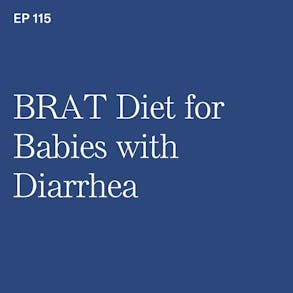
LISTEN TO THIS EPISODE
Episode Description
The BRAT diet has been recommended for decades as a way to combat diarrhea. BRAT is an acronym standing for bananas, rice, applesauce and toast. But does BRAT work and should it be used for babies?
In this episode we’re looking at diarrheal disease in babies: what causes it and what steps should be taken to help babies who have diarrhea. Do you need to cut out milk and dairy if your baby has diarrhea? What types of foods can babies who have diarrhea eat? ...and is the BRAT diet safe for babies?
Links from this Episode
- Baby-Led Weaning with Katie Ferraro program with the 100 First Foods™ Daily Meal Plan, join here: https://babyledweaning.co/program
- Baby-Led Weaning for Beginners free online workshop with 100 First Foods™ list to all attendees, register here: https://babyledweaning.co/baby-led-weaning-for-beginners
Other Episode Related to this topic
- Episode 108 - “Probiotics: Should Your Baby Be Taking Probiotics? with James Marin, RD, EN and Dahlia Marin, RDN, LD”
Resources & Research
- Falcomer, A. L., Riquette, R. F. R., de Lima, B. R., Ginani, V. C., & Zandonadi, R. P. (2019). Health benefits of green banana consumption: A systematic review. Nutrients, 11(6), 1222. https://www.ncbi.nlm.nih.gov/pmc/articles/PMC6627159/
- Kianmehr, M., Saber, A., Moshari, J., Ahmadi, R., & Basiri-Moghadam, M. (2016). The effect of G-ORS along with rice soup in the treatment of acute diarrhea in children: A single-blind randomized controlled trial. Nursing and midwifery studies, 5(2). https://www.ncbi.nlm.nih.gov/pmc/articles/PMC4993029/#:~:text=Rice%20soup%20regimen%20was%20highly,consumed%20simultaneously%20with%20G%2DORS.

Latest Episodes
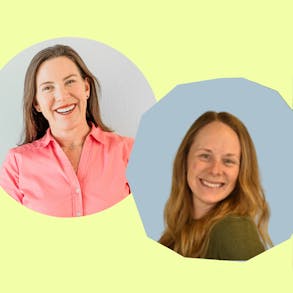
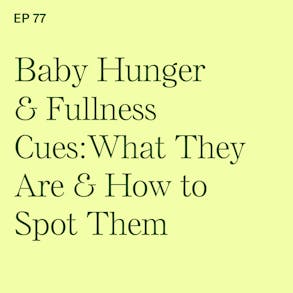
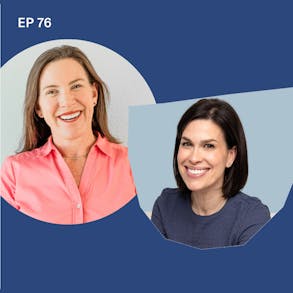
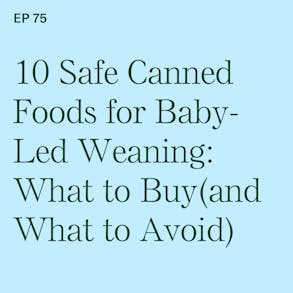
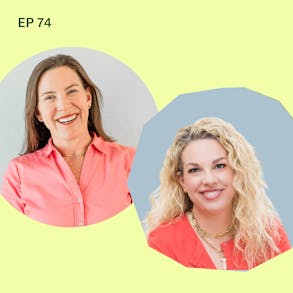
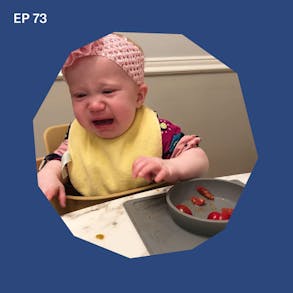
Katie Ferraro (0s):
And so the brat diet, that's feeding your baby bananas, rice applesauce and toast. While historically it's been recommended for treating diarrhea. There's definitely no research supporting that that's effective can actually be dangerous. Instead we needed these flooring, the underlying cause of the actual diarrhea. Hey there I'm Katie Ferraro, registered dietician, college nutrition, professor and mama seven specializing in baby led weaning here on the baby led weaning made easy podcast. I help you strip out all of the noise and nonsense about feeding, leaving you with the competence and knowledge. You need to give your baby a safe start to solid foods using baby led weaning.
Katie Ferraro (43s):
Hey guys! Welcome back today. We are looking closely at the brat diet for babies, with diarrhea. Now the brat diet, if you've never heard of it, it's an acronym that stands for bananas, rice, applesauce and toast. And it's a therapeutic diet that historically had been recommended for people who have diarrhea, including babies, but does it work? And should we be doing a diet like this for our babies, if and when they have diarrhea, that's what I'm looking to explore in today's episode. Now, before we get started the brat diet, just from like a little bit of a historical perspective has been around since the 1920s. It is today. However, not recommended by the American Academy of Pediatrics, as well as a number of other health bodies, because it does not satisfy the nutrient requirements for a growing baby.
Katie Ferraro (1m 30s):
So the theory behind the brat diet was that by consuming only these bland, easy to digest foods, people could reduce the symptoms of a stomach illness, things like nausea or diarrhea, vomiting. Sometimes when babies have diarrhea, they might hear online, hear from other resources, even pediatrician sometimes, do still recommend the brat diet. And so that conventional practice had been to not give typical foods to a child or a baby, and then only give bananas rice applesauce or toast until the diarrhea resolved. So if we look at nutrition recommendations and evidence across the board, nutrition professionals recommend against restrictive diets, just like the American Academy of Pediatric, because the brat diet, there's no evidence indicating that they're necessary during acute diarrheal illness.
Katie Ferraro (2m 21s):
However, there are some clinicians that will recommend a progression of starchy carbohydrates, so cereals and breads and low fat meats, and then layering in some vegetables and fruits. And then the goal with that progression is to limit large amounts of what we call hyperosmotic carbohydrates. And these are foods that may be mal-digested, or mal-absorbed that stimulate the secretion of a lot of fluids. And that may speed the rate of transit through the gut, which is something we definitely don't want to do. If the individual already has diarrhea. When looking at the safety of the brat diet, it's thought that following this for a limited amount of time would probably not cause harm, but we do want to stress that it shouldn't be used long-term because of course it can lead to malnutrition and not enough calories due to the inadequate intake of nutrients in calories.
Katie Ferraro (3m 9s):
So if brat foods are like a usual part of your child's diet, then you can continue to offer them alongside other foods. And when we're looking at diarrhea, it's important for parents, not just to be focusing on what foods do we feed, but what's the underlying cause of diarrhea. So diarrhea is generally defined as having three or more watery or loose stools in 24 hours. Now the cause can be acute. Like a virus is the most common cause a bacteria, a less common cause Giardia, which in certain parts of the world can be commonplace is actually more likely in childcare centers. There can also be antibiotic diarrhea because certain antibiotics can cause diarrhea.
Katie Ferraro (3m 51s):
So we want to look at the cause of the acute diarrhea. Okay. Now, if there's recurrent diarrhea, there can be a number of causes. If your child is continually experiencing this. And in many cases it may be a cow's milk allergy or lactose intolerance. Now lactose intolerance is certainly not as commonplace in children as it is in adults, but we should note that most children who have diarrhea can tolerate milk or formula. Well, okay. The diarrhea is oftentimes associated with a reduction in intestinal lactase. That's the enzyme required to break down lactose, which is milk sugar. The change is not clinically significant, like eliminating dairy and about 80% or more of the patients.
Katie Ferraro (4m 32s):
So this notion that if you have diarrhea, you should stop all dairy products. We also don't know whether or not that is true diarrhea in young children is certainly can be life-threatening. There's an increased risk of very rapid dehydration. So if that bout of loose watery, stools lasts more than a day in your baby. There is a risk of dehydration because of the loss of these essential fluids. So you don't want to go trying to treat the diarrhea with some therapeutic diet. If you truly don't understand the reason why the baby has the underlying diarrhea. So mild diarrhea, which a lot of our babies will experience. It's uncomfortable, but usually not dangerous. The baby can continue to drink fluids and eat a regular diet. In some cultures, there are home remedies that may be used for diarrhea, like boiled milk or rice water, sports drinks, just want to analyze ensure that they're safe, first of all, and then also that they don't have any added sugar because of course we don't feed added sugar to babies and added sugar in the diet can actually exacerbate the diarrhea.
Katie Ferraro (5m 31s):
We talk a lot about babies on the podcast, but before you know it, your baby is the toddler and you've got a whole new challenge to tackle. And that's how do you choose your kid's shoes? And it's hard because kids shoe sizing varies so much from brand to brand, right? Like as a mom of seven, I totally know this firsthand like, oh, there's six and Nike, but that's really a seven and vans. And of course it doesn't help that your kid's feet are constantly growing. And I cannot stand when I order the wrong size shoe, which is why I was so excited to discover Jenzy. So Jenzy helps you shop for your kids shoes that are guaranteed to fit their app, sends you the perfect size for your child. Like all from the comfort of your own home.
Katie Ferraro (6m 11s):
Here's how it works. It's so easy. You just take a picture of your kid's foot and Jenzy app curate a line of top brands tailored to your child. So Jenzy calculates your child's measurements and then matches them to the best size in each pair of shoes on their marketplace. Like no more guesswork. You choose the shoes. Jenzy picks the size. Plus they have free shipping and returns. That is, you know, if you ever need to return something, but you won't because you're ordering the right size shoes. So Jenzy is offering our listeners $15 off your first order of a minimum of $50. All you have to do is download the Jenzy app. It's free and use the code made easy to redeem that discount. So again, just look up the Jenzy app, it's spelled J E N Z Y.
Katie Ferraro (6m 51s):
Download it and use the code made easy for $15 off. And now you've been start ordering the shoes you want, knowing that the right size you need is what's going to show up. Okay? So if you were to treat a baby's diarrhea or a small child's diarrhea using ingredients that have a lot of sugar like chooses or cookies or cakes or sodas that actually can contribute to the diarrhea by pulling more fluid into the intestines, which is what we don't want to do. So what do we want to do if the child has diarrhea while the American Academy of Pediatrics reminds us that most children with mild diarrhea can continue to eat a normal diet.
Katie Ferraro (7m 33s):
That includes formula or milk. If mom is breastfeeding, keep on doing. So if you do notice that your child is seeming to be more gassy or bloated after having foods that contain cow's milk, it might be beneficial. If this is a recurrent problem with the diarrhea and the GI distress to start looking into possible cow's milk protein allergy, and you don't need special fluids for mild illness, but children who do have moderate diarrhea may be in need of electrolyte solutions that can help replace the water and the salts during diarrhea. But it's important to note, we should not be preparing these at home because the wrong ratio of salts and sugars can be dangerous. So you do always want to consult with your pediatrician.
Katie Ferraro (8m 14s):
Now, as far as what sort of foods to feed, there are clinical studies that show that most babies will tolerate complex carbohydrates, meaning not the simple sugars. So don't go pumping her baby's guts full of refined sugar, but we look at the more complex carbohydrates, okay. Rice, wheat, potatoes, breads cereals, fruits, vegetables, and the brat diet. It's kind of like a retro thing that was much more popular in the, I would say the earlier mid part of the 20th century, there's not any actual recent clinical trials looking at whether or not it is effective. So people kind of use it across the board because for a short period of time, it doesn't seem to be harmful, but do remember that you don't want to have your baby sticking to just four foods, banana rice, applesauce, and toast for any significant period of time, because it is inadequate in nutrition.
Katie Ferraro (9m 2s):
And there are some cool studies where researchers have investigated like the potential roles of some of the components of the brat diet, particularly bananas and rice. So there's one review article from 2019 that found that green banana pulp may reduce both diarrhea and constipation in children, which is kind of ironic. Cause those are opposite problems, right? There's another study from 2016 that showed that rice in the form of a soup could effectively treat diarrhea in children who consumed it along with a prescribed oral rehydration solution. So again, it is important that if your child is dehydrated enough or ill enough to require an oral rehydration solution that it's being done under the guidance of the primary care practitioner or the pediatrician.
Katie Ferraro (9m 45s):
Hey, so what's the takeaway message. If your baby has diarrhea, let's look at the underlying cause of the diarrhea. If the diarrhea Appears to be lasting for longer than a day, we certainly would want to consult the pediatrician. You don't need to go making all sorts of adjustments to the baby's diet and just feeding the baby banana rice applesauce or toast for any significant period of time would be nutritionally, inadequate and is not recommended. Now, if you guys are looking for more information about kind of the gut related stuff, I have two other resources for you. I want to recommend I did an interview episode with James and Dahlia Marin. They're two registered dieticians that are on social at married to health, and they specialize in gut and intestinal health.
Katie Ferraro (10m 29s):
In that episode, we were talking about probiotics. So for some babies that have maybe had prolonged use of antibiotics for an underlying medical condition, in some cases, probiotic use may be indicated for their intestinal health that's episode one zero eight. So if you go to blwpodcast.com/108, you can hear the episode about probiotics. Should your baby be taking probiotics with James and Dahlia Marin? I also have a blog post called help. My baby is constipated and you might be like, I came here to learn about diarrhea. Why would I want to read a blog post about constipation, but in that blog post, I'm talking about when you would want to be concerned about either your baby's constipation and then what you can do if they have diarrhea as well.
Katie Ferraro (11m 15s):
So also inside of that post, there is a recipe for a homemade apple prune puree that if your baby is constipated, you could give to kind of get things going. And we do that with baby led weaning on a pre-loaded spoon because we don't feed baby sticky fruits like prunes, but you can make them safe by making it into a puree and offering it on a preloaded spoon. But if your baby has diarrhea, you wouldn't want to give a food like prunes or pairs. For example, those foods contain sorbitol, which is a natural sugar alcohol. It acts as a laxative in the gut, which kind of moves things along even quicker. Again, something we want to stay away from if the baby does have diarrhea. And for those of you just getting started on solid foods, if you want to learn more about giving your baby a safe start to solid foods, as well as a few of the things that you know might go a little bit wrong in the first few days of feeding, I have a quick start guide to baby led weaning.
Katie Ferraro (12m 7s):
You just might want to check out it's a 16-page ebook jam-packed with everything you need to get a safe start to solid foods. I do a whole nutrient deep dive in there. So you'll never wonder if your baby's getting enough of the important nutrients like iron and zinc. And I'm also sharing some ideas about seasoning your baby's food without salt, because sometimes we think, oh, it diarrhea. We need to feed all these bland foods. That's not necessarily the case. Babies don't have to eat bland foods, but we don't want to be giving babies added salt. So I have a salt-free seasoning guide and tons of tips in there, including my most favorite recipe for this savory salt-free seasoning. I put it on all sorts of proteins and all sorts of vegetables or babies.
Katie Ferraro (12m 47s):
Again, that's all inside of the quick start guide to baby led weaning. And I'll link that up on the show notes for this episode at blwpodcast.com/115. Thanks for listening guys. See you next time.

The Program Baby-Led Weaning with Katie Ferraro
A step-by-step digital program for starting solid foods safely and navigating the original 100 FIRST FOODS™ meal plan with baby-led weaning.
 EXPERT-LED, PROVEN APPROACH TO EATING REAL FOOD
EXPERT-LED, PROVEN APPROACH TO EATING REAL FOOD CONCISE VIDEO TRAININGS TO MASTER BABY-LED WEANING
CONCISE VIDEO TRAININGS TO MASTER BABY-LED WEANING 100 FIRST FOODS DAILY MEAL PLAN WITH FOOD PREP VIDEOS
100 FIRST FOODS DAILY MEAL PLAN WITH FOOD PREP VIDEOS
Baby-Led Weaning for Beginners Free Workshop
Is your baby ready to start solid foods, but you’re not sure where to start? Get ready to give your baby a solid foundation to a lifetime of loving real food…even if you’re feeling overwhelmed or confused about this next stage of infant feeding.
Get baby-led weaning recipes and tips delivered to your email inbox.

